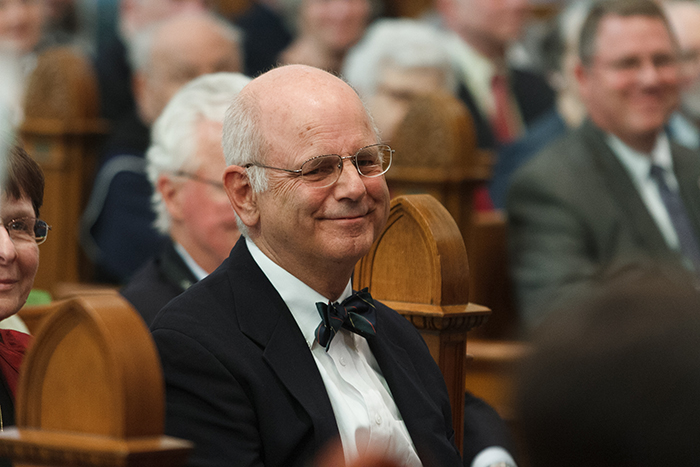An Appreciation of Truman Bullard: You Didn’t Want to Miss Him

Truman Bullard attends a 2014 concert of Brahms' Requiem.
Remembering a legendary educator and the passion for music he inspired
by Richard Koenig ’71
Virtuosity takes many forms, and in that winter and spring of 1968-69, you could find it in a basement classroom of what was then the music building. That was where Music 102, Music History from the Classical Era to the Present Day, was taught. It was where you could experience Truman Bullard.
Professor Bullard elevated teaching to performance. He might open with an introduction to musical convention in the 18th century; segue to an analysis of Mozart's Symphony No. 40, the lecture now a celebration of genius bursting through convention; and then, after a fluid commotion in the exposed pipes overhead, quip instantly, "Soup on the way to the Holland Union Building," home of the student cafeteria.
Kids would show up even when they weren't taking the course. You arrived early to get a seat.
By my sophomore year at Dickinson, I'd often seen Professor Bullard bustling about campus: the short figure, the bald dome of a head, the deep-set eyes that seemed to have so much going on behind them it was a little scary. Go ahead, take Bullard, friends told me. His course can be tough, but you don't want to miss him.
I was a miserable prospect for any course in music history. Though the son of a coloratura soprano, I had trouble carrying a tune. I quit the piano at age 7, my mastery stunted at "Three Blind Mice." The clarinet lasted a year. My mother gave up. Whatever I might do in life, music wasn't going to be part of it, and yet I took the plunge. Music 102 it would be.
Mozart's 40th, as I recall, was the first piece on the syllabus. It served to unveil music as architecture. The sound, to be sure, transcended musical notation. Yet there was a structure from which the magnificence arose, a structure that Professor Bullard managed to reveal, note by note, phrase by phrase, even to a musical illiterate like me.
Romping through musical periods, our class arrived at Beethoven's Fifth, Berlioz's Symphonie Fantastique, Stravinsky's The Rite of Spring. There were other such standards, though by now recollection dims. Was it Copland's Rodeo or his Appalachian Spring? No matter. Instruction in one motivated me to discover the other.
Oh, what we heard in that basement under the shuddering pipes! Late in the semester came Debussy's Prelude à l'aprés-midi d'un faune—the opening solo performed live by a guest flutist, Beth Bullard. The professor accompanied his wife at the piano. Anyone who has gone through Dickinson will know how welcome is the end of a Carlisle winter. That year the Debussy wafted in with the spring.
There were terrors, too, foremost an early essay assignment. It had to do with an art song by Schubert, how composition served expression. I could sense the expression, but I had no clue as to the composition, nor the musical vocabulary to articulate it. I buried myself in the college library for days to contrive some 2,000 words. Major and minor keys, repeat signs, Italian terms denoting tempo—I scrambled to relearn anything I'd picked up in boyhood and to grasp at much I hadn't.
That paper went in with a prayer and came back with a "B." Some might say I was learning how to learn. I'd say I was learning that Professor Bullard was a generous man.
What I did learn—and this, I like to think, is what stayed with me—was how to concentrate in a new way: how to listen. No music was mood music, not in that class. During an exam, Professor Bullard would play excerpts of recordings we had studied. It went like this: Which composer is that? Brahms. Which symphony? The first. Which movement? The third. Which part of the third? The allegretto.
Music wasn't instantly accessible in those days. You went to the library and clapped on headphones. Or you bought vinyl records and dispossessed the rare friend who owned a stereo system. One of my fraternity brothers had a stereo, but not on days leading up to a Bullard exam, when a gang of us would commandeer his room. Understand that we would be holed up there, sharing our records, quizzing one another, during a lovely weekend that might otherwise find some of us outdoors with beers in our hands.
I suppose that is the other big thing I learned. A man aflame with his art, a Truman Bullard, conductor, composer, pianist, bassoonist, and teaching virtuoso, can throw up sparks that land on others and make them behave in strange and wonderful ways.
Truman Bullard, professor emeritus of music, died at age 85 on March 13, 2024. This recollection of his teaching is adapted from an article that appeared in the Pittsburgh Post-Gazette on Nov. 25, 2012.
The Truman Bullard Scholarship Fund and Beth and Truman Bullard Performance Series, founded by Truman and Beth Bullard, support students' musical educations at Dickinson. To make a gift toward these funds, visit dickinson.edu/gift.
Read more about Truman Bullard:
- More Truman Bullard Remembrances
- "'You Had Me at Truman'"
- "An Auditory History"
- "Dr. Truman Bullard 75th Birthday Celebration/Fundraising Campaign"
TAKE THE NEXT STEPS
Published April 1, 2024